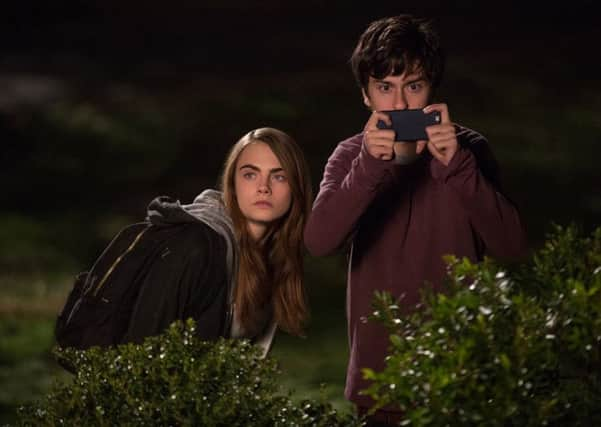Film review: Paper Towns


PAPER TOWNS (12A)
Directed by: Jake Schreier
Starring: Nat Wolff, Cara Delevingne, Austin Abrams, Justin Smith
Star rating: **
Adapted from a Young Adult novel from The Fault in Our Stars author John Green, Paper Towns is a patently ridiculous story that, almost in spite of itself, succeeds in saying something interesting about its teen audience before ultimately revealing itself to be entirely vacuous after all.
Advertisement
Hide AdWith no terminal illness plot device to offset the perky sarcasm of its characters, this time out we’re dealing squarely with the whiny concerns of a bunch of Hollywood-nerdy teens worried that they’re missing out on life. Chief among these worriers is Quentin (Nat Wolff), who’s had the misfortune of growing up next to Brooke Shields-doppelganger Margo (Cara Delevingne) since he was five. To paraphrase Winston Churchill, Margo is a riddle wrapped up in a mystery inside an enigma. Her childhood quickly diverged from Quentin’s following their discovery of a dead body together as kids: as she sought more adventure – frequently running away and cultivating a myth around herself – he threw himself into school, working hard to get good grades to the point where he’s decided to postpone any and all fun for some future date in which he imagines he’ll finally be able to enjoy the fruits of all his studying, having landed a good career as a doctor.
As the end of high school approaches, though, Margo takes it upon herself to stage an intervention of sorts and break this pattern of passivity in her old friend. Climbing through his window one night, she dares him to drive her around while she settles some scores with those who have wronged her. Kind of like a sappy teen version of Collateral, this mostly involves her perpetrating minor acts of vandalism, but it emboldens Quentin to, if not quite make a move on Margo (whom he’s loved since they were five), at least think about making a move quite soon.
When she fails to turn up for school the next day – or the day after, or the day after that – he takes her disappearance as a sign that he should track her down and tell her how he really feels. At which point the film goes completely off the rails, resembling an unintentionally deranged teen spin on Gone Girl as Quentin starts pulling clues out of thin air in order to convince himself and his two best friends that she wants him to find her.
What emerges could have been a fascinating look at the way teenagers let their hormones and limited experience of the world overwhelm them to such an extent that they embark on weird journeys of self discovery that contradict what they’ve learned from movies and books.
Unfortunately, the film just wants to be an inoffensive seize-the-moment parable for teens, which makes the nonsensical plotting seem even more bizarre.